
Speakers:
Soumeya BEKRI – Abdellah TEBANI – Hatim ABDULHUSSEIN – Shadi ALBARQOUNI – Nassim BOUTOUCHENT – Guillaume CANAUD – Fouad T. CHEBIB –
Pierre-Alexis DA COSTA – Mie Seest DAM – Franklin DUCATEZ – Patricia Ellen GRANT – Ursula HEINS MARROQUIN – Simon JONES – Didier LACOMBE
Peter LAUSSEN – Zacharia MESBAH – Joseph NADEAU – Mette Nordahl SVENDSEN – Mark A. RUBIN – Manuel SCHIFF – Yannick THIRIET – Sarah WAMALA ANDERSSON – Eva WINKLER

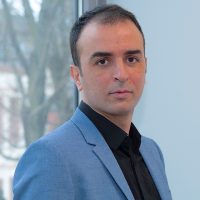
Abstract - Newborn Screening for Lysosomal Diseases: Insights from the LysoNeo Study
The LysoNeo Study is a large-scale pilot program designed to evaluate the feasibility and effectiveness of systematic neonatal screening for lysosomal diseases using Dried Blood Spots (DBS) in a cohort of 100,000 newborns in the Normandy region. The primary objective is to assess the potential for early detection of Mucopolysaccharidosis type I (MPS I) and Pompe disease, where timely diagnosis is known to significantly improve clinical outcomes. In addition to these two diseases, the study expands screening to include 11 other lysosomal disorders: Krabbe disease, Niemann-Pick A/B disease, mucopolysaccharidoses (MPS II, MPS IIIB, MPS IVA, MPS IVB, MPS VI, MPS VII), neuronal lipofuscinosis type 2 (CLN2), Lysosomal Acid Lipase Deficiency (LALD), and Metachromatic Leukodystrophy (MLD).To enhance both screening accuracy and effectiveness, the study deploys a multi-tiered screening platform that incorporates advanced multiplex analyte-based enzymatic assays, tandem mass spectrometry (MS/MS) technology, and Next-Generation Sequencing (NGS)-based molecular investigation for confirmation. This layered approach enables a more precise and thorough assessment, improving both detection sensitivity and specificity for lysosomal diseases. The study evaluates each phase of the screening process—from sample collection to data interpretation and patient management—in real-world conditions. It dynamically integrates the latest treatment advancements, adapting to evolving therapies and clearance protocols, ensuring that the screening process remains aligned with the most effective, evidence-based medical practices. Key performance metrics are also collected to assess the impact of early diagnosis on patient outcomes.The LysoNeo Study aims to provide critical data on the feasibility of integrating an expanded lysosomal disease panel into newborn screening programs, with the goal of improving early diagnosis and patient outcomes. In this presentation, we will share key insights from the study, focusing on implementation challenges and preliminary outcomes.

Health Innovation Kent Surrey Sussex, Keele, UK
Hatim is Chief Executive Officer for Health Innovation Kent Surrey Sussex, part of the NHS Health Innovation Network. Alongside this role, he continues to practice as a General Practitioner.
In 2018, Hatim was appointed National Medical Directors Clinical Fellow to Professor Wendy Reid by the Faculty of Medical Leadership and Management. His key achievements were co-author and member of the Sir Keith Pearson Commission into NHS Staff and Learner Mental Health and co-founding the ‘Topol Programme for Digital Health Fellowships’ launched by Secretary of State for Health and Social Care in 2019. He later became the National Clinical Lead for AI and Digital Workforce at NHS England providing clinical leadership to the NHS Digital Academy and leading on AI in the NHS’s historic Long Term Workforce Plan.
Hatim studied Medicine at the prestigious Barts and the London School of Medicine and Dentistry, going on to complete a Masters in Sports and Exercise from the University of South Wales, and a Postgraduate Diploma in Digital Health Leadership from Imperial College London. Hatim holds Membership of the Faculty of Clinical Informatics and the Royal College of General Practitioners, as well as Fellowship of Advance Higher Education.
Hatim has been a Senior Lecturer at Brunel University London, supporting the Physician Associate MSc and development of Brunel Medical School. Hatim is a Honorary Senior Lecturer at Keele University, working with European partners to develop a Masters in Explainable AI in healthcare management. Hatim is also a member of the National Institute for Health and Care Excellence Technology Appraisals Committee, and the Coalition for Health AI Steering Committee.
Hatim is an advocate for safe, ethical and responsible digital and AI transformation and ensuring workforce preparedness for new innovations and technologies in health and care. He regularly speaks internationally and has contributed to the publication of academic papers and white papers spanning workforce, education reform, primary care, digital health and AI.
Outside of work Hatim enjoys travelling and football, and you will likely find him touring England’s best restaurants with his family.
Abstract - Enabling Next-Gen Healthcare Workforce: From Vision to Reality
In this talk, we will explore the transformative vision set forth by the Topol Review, which aims to prepare the healthcare workforce to deliver the digital future. We will delve into how the NHS is adapting to and preparing for new technologies, with a particular focus on the impact of artificial intelligence (AI) on the workforce. Drawing from our extensive work within the NHS, we will highlight key insights and lessons learned in understanding the workforce implications of AI. Additionally, we will discuss the proactive measures being taken at Health Innovation KSS to equip the future healthcare workforce with the necessary skills and knowledge to thrive in an increasingly digital and data-driven environment. Join us as we navigate the journey from vision to reality, ensuring that our healthcare professionals are well-prepared to embrace the innovations of tomorrow.
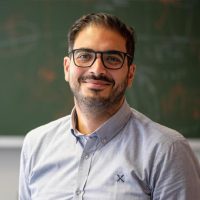
University of Bonn, Bonn, GERMANY
Shadi Albarqouni is a Palestinian-German Professor of Computational Medical Imaging Research. He received his B.Sc. and M.Sc. in Electrical Engineering from the IU Gaza, Palestine, in 2005, and 2010, respectively. In 2012, he received the DAAD research grant to pursue his Ph.D. at the Chair for Computer Aided Medical Procedures (CAMP), Technical University of Munich (TUM), Germany. During his Ph.D., Albarqouni worked with Prof. Nassir Navab on developing machine learning algorithms to handle noisy labels, coming from crowdsourcing, in medical imaging. His AggNet paper, published at the Special Issue on Deep Learning at the IEEE Transaction on Medcial Imaging (IF: 10.048), was among the first ones on Medical Imaging with Deep Learning and has been featured as the top downloaded article for a couple of years at IEEEXplore.
Albarqouni worked as a Senior Research Scientist & Team Lead at CAMP leading the Medical Image Analysis (MedIA). Together with his team addressed the common challenges concern the nature of medical data, namely heterogeneity, severe class-imbalance, few amounts of annotated data, inter-/intra-scanners variability (domain shift), inter-/intra-observer disagreement (noisy annotations). In 2019, Albarqouni received the prestigious P.R.I.M.E. fellowship for a one-year international mobility, where he worked as a Visiting Scientist at the Department of Information Technology and Electrical Engineering (D-ITET) at ETH Zürich, Switzerland. He worked with Prof. Ender Konukoglu on Modeling Uncertainty in Medical Imaging, in particular, the one associated with inter-/intra-raters variability. Afterwards, Albarqouni worked as a Visting Scientist with Prof. Daniel Rueckert at the Department of Computing at Imperial College London, United Kingdom.
Since Nov. 2020, Albarqouni has been appointed as an AI Young Investigator Group Leader at Helmholtz AI. The aim of Albarqouni’s Lab. is to develop innovative deep Federated Learning algorithms that can distill and share the knowledge among AI agents in a robust and privacy-preserved fashion. Since Jan. 2022, Albarqouni has been appointed as a W2 Professor of Computational Medical Imaging Research at the Faculty of Medicine, University of Bonn.
Albarqouni has more than 100 peer-reviewed publications in both Medical Imaging Computing and Computer Vision published in high impacted journals and top-tier conferences. He is an active member of MICCAI, BMVA, IEEE EMBS, IEEE CS, and ESR society. Recently, Albarqouni has been elected as a member for the European Lab for Learning and Intelligent Systems (ELLIS), the Arab German Young Academy (AGYA), and the Higher Council for Innovation and Excellence in Diaspora (HCIE). Since 2015, he has been serving as a PC member for a couple of MICCAI workshops, e.g., COMPAY, DART, DCL, FAIR among others. Since 2019, Albarqouni has been serving as an Area Chair in Advance Machine Learning Theory at MICCAI. Recently, he has been serving as a Program Co-Chair at MIDL’22 in Swizterland, and as an Organizing Committee Member at ISBI’22 in India, MICCAI’24 in Morocco. His current research interests include Interpretable ML, Robustness, Uncertainty, and Federated Learning. He is also interested in Entrepreneurship and Startups for Innovative Medical Solutions with limited resources.
Abstract - Leveraging Collective Intelligence for inclusive Global Healthcare
Deep Learning (DL) stands at the forefront of artificial intelligence, revolutionizing computer science with its prowess in various tasks, especially in computer vision and medical applications. Yet, its success hinges on vast data resources, a challenge exacerbated in healthcare by privacy concerns. Enter Federated Learning, a groundbreaking technology poised to transform how DL models are trained without compromising data security. By allowing local hospitals to share only trained parameters with a centralized DL model, Federated Learning fosters collaboration while preserving privacy. However, hurdles persist, including heterogeneity, domain shift, data scarcity, and multi-modal complexities inherent in medical imaging. In this illuminating talk, we delve into the clinical workflow and confront the common challenges facing AI in Medicine. Our focus then shifts to Federated Learning, exploring its promise, pitfalls, and potential solutions. Drawing from recent breakthroughs, including a compelling MR Brain imaging case study published in Nature Machine Intelligence, we navigate the landscape of secure and efficient AI adoption in healthcare.
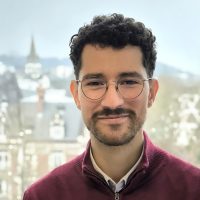
Nassim BOUTOUCHENT
Rouen University Hospital, Rouen, FRANCE
I am a junior doctor specializing in laboratory medicine at the Microbiology Department of Rouen University Hospital. Alongside my clinical residency, I am developing a research career in microbiology and omics sciences, aiming to bridge computational, fundamental, and clinical research to better understand the interactions of microbiomes and their impact on human health.
In addition to my medical and research training, I have been actively involved in education. From 2021 to 2023, I served as a microbiology tutor at Rouen Medical School and later as Vice President in charge of training courses for pharmacy students within the “Association des Internes en Pharmacie et Biologie Médicale de Rouen.”
After earning a university certificate in anti-infective chemotherapy strategies at Rouen Medical School, I was awarded a research fellowship in 2023 by the University Hospital of Rouen. This allowed me to pursue a master’s degree in Molecular and Cellular Biology at the Pasteur Institute of Paris, co-organized by Sorbonne University and Université Paris Cité. Under the supervision of Dr. Sean Kennedy in the Computational Biology Department, I contributed to the InSPIRe (Innovation Strategies for Perinatal Infection Risk-Reduction) cohort study, investigating the role of the vaginal microbiome in pregnant women and its links to urogenital infections. My current research focuses on vaginal resistome and examines the impact of antibiotic exposure during pregnancy.
Building on this, I plan to pursue a PhD on human microbiomes and their interactions using multi-omics approaches. My goal is to better understand their role in women’s urogenital infections and antibiotic resistance, ultimately developing personalized, non-antibiotic therapies to improve women’s health.
Abstract - Antibiotic resistance genes diversity and antimicrobial effects in the vaginal microbiome during pregnancy
Background: Materno-fetal infections are a leading cause of morbidity and mortality, often requiring complex antibiotic treatments due to increasing antibiotic resistance. However, the determinants and dynamics of resistance in vaginal microbial communities are poorly understood. Methods In this prospective observational study, we performed whole genome shotgun metagenomic analysis of vaginal samples collected from pregnant women in their third trimester. Microbial taxonomic assignment was performed using a dedicated in-house vaginal microbiota Kraken2 database, with species-level abundance adjusted using Bracken. Clinically relevant antibiotic resistance genes (ARGs) in vaginal resistome were identified using the ResFinder database. Normalized read count tables were analyzed to characterize the vaginal resistome and evaluate shifts associated with antibiotic exposure during pregnancy. ARGs diversity was assessed through α and β-diversity metrics. In addition, ARGs phenotype predictions similarities were used to construct a phenotypic resistance tree, facilitating the development of a novel diversity index specific to clinically relevant ARGs.
Results: We analyzed 1,938 samples from 1,543 pregnant women, including 395 with two samples taken at different timepoints. The vaginal resistome revealed 547 distinct ARGs, 60% (328/547) conferring resistance to beta-lactams. The average ARG richness was 6.8 (SD ± 8). Most abundant ARGs conferred resistance to macrolides (47.4%), tetracyclines (30.7%), and beta-lactams (7.1%). lsa(C) and tet(M) were the most frequent and abundant ARGs. These genes were predominantly harbored by species from the Lactobacillales order, whereas species from the Enterobacterales order harbored a broader diversity of ARGs across different antibiotic classes, including beta-lactams, aminoglycosides, and sulfonamides. Comparative analysis based on antibiotic use during pregnancy (wATB vs. woATB) showed a twofold increase in beta-lactam resistance ARGs relative abundance in the wATB group at delivery (p = 0.007). The Shannon diversity index revealed a significant difference in ARGs intra-sample diversity between the wATB and woATB groups during pregnancy (p = 0.02), but not at delivery. The novel phenotypic resistance diversity index (PRDI) captured significant differences at both timepoint (p = 0.003 and 0.02 respectively), indicating that while no differences in richness and evenness were observed at delivery, the predictive ARGs resistance phenotypes differed, with a broader spectrum of resistant phenotypes in the vaginal ecosystem at delivery for women who received antibiotic therapy during pregnancy.
Conclusion: Clinically relevant ARGs in the vaginal resistome predominantly confer resistance to macrolides and tetracyclines and are partly harbored by the core communities of the vaginal microbiota. A functionally aware analysis, using PRDI, provides a novel approach to assess ARGs diversity, beyond traditional metrics. By considering the individual variability of the microbiome and resistome, this approach could deepen our understanding of resistome dynamics across different ecosystems and lead to more targeted strategies for improving maternal and child health. Conflict of interest None to declare.
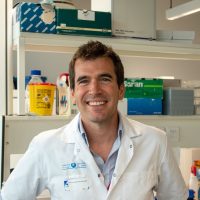
Necker Enfants Malades - Assistance Publique-Hôpitaux de Paris, Paris, FRANCE
Guillaume Canaud is a MD, PhD working at hôpital Necker Enfants Malades (Paris). He did his medical school in Montpellier and moved to Paris in 2002 to perform his Residency in Nephrology (2002 to 2007). He became Senior Resident in the Renal Division of Necker (Prof. Legendre) from 2007 to 2012. Concurrently, he spent four years from to 2008 to 2012 in the laboratory of Dr. Fabiola Terzi (INSERM U1151, Necker Hospital) to achieve his PhD degree in molecular and cellular biology. Then, he joined the Joseph Bonventre’s Laboratory (Harvard Medical School, Boston, USA) from 2012 to 2014 to achieve a postdoc. He came back to Christophe Legendre’s team with a faculty position (Associate Professor) and built his own group of research dedicated to translational medicine. He obtained an European Research Council starting grant (2015) for his kidney research project, an ERC Proof of Concept Grant for his translational research (2016) and an ERC Consolidator (2020) dedicated to the understanding of PIK3CA related disorders. Guillaume is now full professor at the Université Paris Cité /Hôpital Necker Enfants Malades and is working specifically on rare disorders involving the RAS/PIK3CA/AKT/mTOR pathways. He has created the Translational Medicine and Targeted Therapies Unit at Necker Enfants Malades.
Very recently, Guillaume and his group, identified and reported in Nature a very promising therapeutic for patients with a rare genetic disorder called PIK3CA-Related Overgrowth Syndrome (PROS). Guillaume and his group pushed the clinical development of this drug for patient with PROS. Three clinical trials were launched since 2019 and led to the US FDA accelerated approval on April 6th 2022 of alpelisib for patients with PROS aged of at least 2 years old.
He published as a first or last author in leading medical and scientific journals such as Nature, The New England Journal of Medicine, Nature Medicine, J Exp Med, Science Translational Medicine or Proceedings of the National Academy of Sciences USA. He received several awards including the 2018 Prize Jean Lecocq of the French Academy of Sciences, the 2019 Prize Eloi Collery of the French Academy of Medicine, the 2019 Ville de Paris Jean Hamburger Prize, the 2021 Unsolicited International Triennial Gagna A. & Ch. Van Heck Prize for Incurable Diseases, the 2022 Robert Schobinger Award from the International Society for the Study of Vascular Anomalies and the Prix Galien 2022.
Abstract - Drug repositioning in CLOVES Syndrom
CLOVES syndrome (congenital lipomatous overgrowth, vascular malformations, epidermal naevi, scoliosis/skeletal and spinal syndrome) is a genetic disorder that results from somatic, mosaic gain-of-function mutations of the PIK3CA gene, and belongs to the spectrum of PIK3CA-related overgrowth syndromes (PROS). This rare condition has no specific treatment and a poor survival rate. Here, we describe a postnatal mouse model of PROS/CLOVES that partially recapitulates the human disease, and demonstrate the efficacy of BYL719, an inhibitor of PIK3CA, in preventing and improving organ dysfunction. On the basis of these results, we used BYL719 to treat nineteen patients with PROS. The drug improved the disease symptoms in all patients. Previously intractable vascular tumours became smaller, congestive heart failure was improved, hemihypertrophy was reduced, and scoliosis was attenuated. The treatment was not associated with any substantial side effects. In conclusion, this study provides the first direct evidence supporting PIK3CA inhibition as a promising therapeutic strategy in patients with PROS.
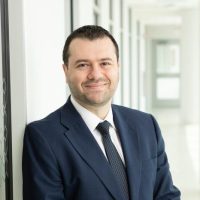
Mayo Clinic Florida, Florida, USA
Dr. Fouad T. Chebib, MD, FASN, is a nephrologist and assistant professor of Medicine at Mayo Clinic Florida. After obtaining his undergraduate degree from the American University of Beirut, and his medical degree from the University of Balamand, Lebanon, Dr. Chebib pursued further specialization through a postdoctoral research fellowship in molecular nephrology and ion channels at Harvard University’s Alper Lab. His journey continued with a residency in internal medicine at Saint Elizabeth Medical Center, Tufts University, and a nephrology fellowship at Mayo Clinic, where he also spent two years as a Mayo Clinic Scholar under the mentorship of Dr. Vicente Torres.
Dr. Chebib’s commitment to combating Polycystic Kidney Disease (PKD) has been evident through his clinical focus and research endeavors aimed at understanding cyst formation in ADPKD and identifying targeted treatments. His efforts have contributed to the establishment of the Tolvaptan Clinic at Mayo Clinic, the first FDA-approved drug to slow PKD progression. An innovator in his field, Dr. Chebib holds a patent for his work and actively participates in major ADPKD clinical trials.
Dr. Chebib is the lead author on the US consensus guidelines on the use of Tolvaptan in ADPKD and has been an invited speaker at numerous national meetings, including the American Society of Nephrology and National Kidney Foundation, as well as various academic institutions. He is a member of the workgroup for the KDOQI US commentary on the KDIGO Clinical Practice Guidelines on ADPKD, where his expertise contributes to shaping clinical practices and guidelines that impact patients globally. Dr. Chebib’s interests includes establishing an individualized approach and precision in diagnosis and prediction of outcomes in ADPKD by leveraging advances in artificial intelligence.
As director of both the PKD Center of Excellence and the Discovery and Translational PKD Research lab at Mayo Clinic Florida, Dr. Chebib spearheads innovative research into novel therapeutic targets for PKD. His active engagement with the PKD Foundation’s Education Advisory Panel and Center of Excellence advisory board further highlights his unwavering commitment to eradicating PKD through education and research.
Abstract - Data-Empowered Strategies in Polykystic Kidney Disease
Precision Imaging in ADPKD: AI-Driven Radiogenomics for Diagnosis and Predicting Disease Progression
In the evolving landscape of precision medicine, artificial intelligence (AI) is transforming the diagnosis and prognostication of complex genetic disorders, particularly Autosomal Dominant Polycystic Kidney Disease (ADPKD). Our research employs advanced AI methodologies, including machine learning and neural networks, to perform high-resolution quantitative analyses of radiological data, uncovering distinct radiomic signatures associated with ADPKD. By systematically assessing key imaging biomarkers—such as total cyst number, volume and cyst parenchymal surface area—we are constructing a comprehensive digital phenotype that enhances the precision of ADPKD characterization.
This digital phenotype facilitates the stratification of ADPKD subtypes, including ADPKD-PKD1, ADPKD-PKD2, ADPKD-GANAB, ADPKD-IFT140, and ADPKD-DNAJB11, each exhibiting distinct radiological profiles reflective of their genetic underpinnings. By integrating AI-driven radiomic profiling with quantitative radiogenomics, we aim to refine diagnostic accuracy and develop predictive models for individualized disease progression. A key focus is forecasting the onset of kidney failure (KF), which in ADPKD patients demonstrates striking heterogeneity, occurring as early as the third decade of life or as late as the eighth.
In this lecture, I will illustrate how AI and radiomic innovations are driving paradigm shifts in ADPKD diagnosis, risk stratification, and prognosis. We will explore how AI-powered imaging biomarkers can inform individualized treatment strategies and optimize clinical decision-making, marking a critical step toward precision nephrology. By leveraging AI in radiogenomics, we move closer to a future where early intervention and tailored therapeutic approaches mitigate disease burden and improve patient outcomes.

Pierre-Alexis DA COSTA
Sorbonne University, Paris, FRANCE
Pierre-Alexis Da Costa is an MD-PhD student. After his first three years of medical studies at the Health Faculty of Rouen, he pursued his educational studies with a Master 2 in immunology at Sorbonne University, followed by a PhD at the Centre de Recherche des Cordeliers in Paris in the Inflammation Complement and Cancer team directed by Prof. Isabelle Cremer. Following his PhD, he plans to return to medical school. His scientific interests include immunology, oncology, image analysis and computational biology (mutiomics).
At the same time, Pierre-Alexis is also committed to improving study conditions. First, he was the vice-president in charge of student representation in 2020-2022 at the « Corporation des étudiants en médecine » of Rouen, of which he is an honorary member, then as the vice-president in charge of Research and Innovation at the « Association Nationale des Etudiants en Médecine de France » in 2022-2024. Finally, since 2023, he has been the President of the « Tutorat Recherche de Rouen » , which promotes research in the Health Faculty of Rouen and is responsible for organizing the local Md-PhD course “Ecole Santé Sciences de Rouen” with Pr. Soumeya Bekri and Pr. François Estour.
Abstract - Deciphering cellular and molecular mechanisms of immune infiltration and Tertiary Lymphoid Structure organization in Non-Small Cell Lung Cancer
Background: The Tumor MicroEnvironment (TME) of Non-Small-Cell Lung Cancer (NSCLC) is highly complex, comprising tumor cells, immune cells, cancer-associated fibroblasts (CAFs), and endothelial cells. Immune cells, especially B and T lymphocytes, can organize in Tertiary Lymphoid Structures (TLS), which are linked to better prognosis and immunotherapy response. Conversely, low adaptive immune infiltration or absence of TLS correlates with poor clinical outcomes. The mechanisms driving immune infiltration and TLS formation in the TME remain poorly understood. We hypothesize that immune infiltration and TLS organization depend on tumor cell phenotype, blood and lymphatic vessel activation and patterning, CAF subsets, and extracellular matrix composition and structure. The study aims to identify a TME signature associated with immune infiltration and TLS organization in NSCLC.
Material and methods: We are analyzing a retrospective cohort of 211 patients who underwent surgery in 2018 at Cochin Hospital, with available clinical data. Immune infiltrate in the TME was characterized using multiplex immunofluorescence. We quantified B and T cell densities, TLS presence/maturation, high endothelial venules, cell proliferation, and tumor cell density. In parallel, we have started quantifying stromal components like CAF subsets and blood/lymphatic vessels. These features were quantified using HALO AI software, followed by bioinformatics analyses to classify the cohort based on immune cell density and TLS presence and maturity.
Results: Preliminary results show that 204 out of 211 patients have at least one mature TLS. High secondary follicle-like TLS density (above median) correlates with better overall survival. Based on this classification, we have selected two patient groups: 9 with low TLS density and 9 with high TLS density. These patients will be analyzed using bulk and spatial transcriptomics (Visium HD, 10X Genomics).
Conclusion: This study will provide insights into the relationship between various TME components particularly CAFs and blood/lymphatic vessels, and immune infiltration, along with transcriptomic profiles of distinct TME subtypes.
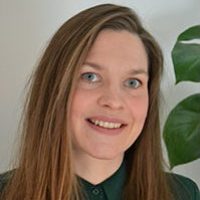
University of Copenhagen, Copenhagen, DENMARK
Mie S. Dam is an Assistant Professor in the Centre for Medical Science and Technology Studies, the University of Copenhagen. Through ethnographic fieldwork in animal-, cell-, and genomic laboratories and at public hospitals, her research addresses the ethical, social, and political aspects of precision oncology and its translation across laboratory, clinic, and patient lives. Trained as a MSc in Public Health, Mie S. Dam strives to weave together specific empirical observations with the broader social and public spheres in which biomedical technologies and healthcare practices develop. Her work has been published and recognized in international high-ranking social science journals.
Abstract - Empowering the Patient in the Precision Medicine Era
In this talk we explore selection practices in precision medicine. Precision medicine holds the great hope of selecting genetically fit medicine for the patient. However, in on-the-ground clinical practices, precision medicine is oriented towards selecting clinically and genetically fit patients for available therapies. Based on ethnographic research in oncology clinics and experimental labs, we show that matching patients with treatment is inseparable from dealing organizationally and morally with the large group of patients identified as unlikely to benefit from personalized cancer therapies. On one hand, precision medicine empowers patients who fit therapies or experimental trials. On the other hand, patients who have contributed their tissue and time to precision medicine, but do not match available therapies feel disempowered. They show us the huge challenges of turning the absence of personalized treatment options into care for patients.

Franklin DUCATEZ
Boston Children’s Hospital, Boston, USA
I am a French physician trained in pediatrics and neonatal intensive care with a strong interest in data-driven medicine. I completed my medical studies in Lyon, followed by a pediatric residency and fellowship in Rouen. During my training, I developed a keen interest in systems biology, which led me to pursue a PhD under the supervision of Pr. Bekri and Pr. Tebani.
Currently, I am a postdoctoral researcher at Boston Children’s Hospital – MA, USA, where I work on signal processing and decision-support tools. My goal is to leverage data science and computational methods to assist clinicians in making more informed and efficient decisions.
I am passionate about bridging the gap between medicine and technology to enhance patient care, and I look forward to exchanging ideas and collaborating in this field.
Abstract - Use of Fourier transformation of monitoring waveforms movement detection in sedated patients
Background: Sedation and analgesia are essential to the care of critically ill infants and children. However, sedative agents also carry significant risks, and thus best practices focus on titrating sedation to the minimum dose required to maintain comfort. The quantification of sedation level remains a critical task in sedation provision. Current practice is for bedside staff to perform intermittent, active assessments of sedation level according to standardized scales. However, these methods are time-intensive, intermittent, and subjective. Establishing a continuously measured, objective metric of sedation level may improve the rigor of sedation assessments, and advance the science of sedation practices in infants and children. The purpose of this work was to quantify patient movement using artifact in photoplethysmograph (PPG) readings in sedated patients.
Methods: 844 hours of continuous PPG waveform were recovered from 39 patients. Waveforms were divided into 10 second increments on which discrete Fourier transformation (FT) was performed. The resulting frequency matrix was then filtered and normalized. For each 10 second increment, the maximum amplitude of the FT-data was identified and used to normalize the entire FT signature. Thereafter, we computed the sum of all FT-amplitudes across the filtered spectrum from 0 to 10 Hz. This resulted in the computation of a single number between 0 and 25 that represented the degree of motion artifact within a 10 second sample, with 0 being perfectly still (i.e. no artifact present) and 25 being nearly all artifact motion artifact.
Results: Raw waveforms (Figure 1A, top) underwent Fourier transformation (Figure 1A, middle), then summarized as a single numerical value assigned to the 10-second sample (Figure 1A, bottom). Analysis and visualization of all 10-second epochs together allowed for a potential visualization of patient movement over time (Figure 1B).
Conclusions: FT of raw waveforms may be useful to quantify patient movement. Validation of these methods against human interpretations of waveform artifact, then of patient motion, are critical next steps.

Harvard Medical School, Boston Children's Hospital, Boston, USA
Dr. Grant is the Käthe Beutler, MD Harvard Professor of Pediatrics and Professor of Radiology at Harvard Medical School. She is the founding Director of the Fetal Neonatal Neuroimaging and Developmental Science Center (FNNDSC) in the Departments of Medicine and Radiology, the Director of Faculty Affairs in the Department of Radiology, the Direct of Research for the Division of Maternal-Fetal Medicine and Surgery and a clinical neuroradiologist at Boston Children’s Hospital.
Dr. Grant founded the FNNDSC in 2009 to develop and optimize tools and analysis streams to better detect and understand both normal and abnormal brain physiology and development. The primary goal is to provide phenotypic and mechanistic information that enables optimization of cognitive, behavioral, and neurological outcomes in children with a focus on fetuses, neonates, infants, and toddlers. Three modalities are being developed in the FNNDSC: Magnetic Resonance Imaging (MRI), Magnetoencephalography (MEG) and quantitative Near Infrared Spectroscopy (qNIRS). She leads a team of MR physicists and engineers doing pulse sequence development and novel MRI analysis at the forefront of fetal and placental MRI. Her team build a novel pediatric specific MEG system that is now FDA approved and provides clinical services for presurgical evaluation of infants and toddlers with epilepsy.
She is a pioneer of frequency domain NIRS (FDNIRS) and diffuse correlation spectroscopy (DCS) which provides quantitative bedside measures of cerebral blood flow and oxygen consumption. To support the computational needs of complex data analysis, her team has developed a sophisticated computational infrastructure in collaboration with RedHat to support deep-learning approaches on large datasets and real time data analysis.
The FNNDSC currently has over 60 members with 17 faculty and 6 postdoctoral students. Dr. Grant is a Senior Fellow of the International Society of Magnetic Resonance in Medicine (ISMRM) and sits on the Board of Scientific Counselors for National Institute of Child Health and Human Development. In 2021 she received the Outstanding Contributions in Research Award from the American Society of Neuroradiology and in 2022 she received the Gold Medal Award from the American Society of Pediatric Neuroradiology. She is currently PI/MPI of 6 NIH grants and her center has over $40M of active funding.
Abstract - Next-Generation Imaging in Fetal and Newborn Medicine
This session will describe novel strategies for image acquisition and analysis aimed at enhancing the clinical management of fetuses and infants. Discussions will delve into the interplay between placental function and fetal brain development, alongside the repercussions of hypoxic stress. Moreover, the session will highlight the burgeoning role of artificial intelligence (AI) in fetal deep phenotyping and in neonatal outcome prediction for hypoxic ischemic encephalopathy (HIE). The potential for vital monitor waveform data combined with novel frequency domain near infrared spectroscopy / diffuse correlation spectroscopy to improve clinical management in the neonatal intensive care unit and provide more nuanced outcome prediction will also be discussed.

Ursula HEINS-MARROQUIN
Luxembourg Center for Systems Biomedicine, Esch-sur-Alzette, LUXEMBOURG
Dr. Heins-Marroquin is a post-doctoral researcher specializing in Batten Disease at the University Medical Center of Utrecht in The Netherlands. She completed her Bachelor’s and Master’s degrees in Molecular Biology at the University of Konstanz. In 2019, she successfully defended her PhD thesis at the Luxembourg Centre for Systems Biomedicine (LCSB) in Luxembourg.
Her primary research focuses on disease modeling for lysosomal storage disorders, with an emphasis on using simple model organisms such as yeast and zebrafish, as well as more sophisticated models like induced pluripotent stem cells (iPSCs). Currently, she is investigating the molecular function of CLN3, a key protein implicated in Batten Disease. She is also developing drug screening pipelines to identify new compounds that could lead to potential treatments for CLN3 disease.
Abstract - Searching for small molecule-based therapies for ATP13A2 deficiencies
Mutations in ATP13A2 cause the Kufor-Rakeb Syndrome, a rare early-onset form of Parkinsonism with dementia. Interestingly, other mutations in the same gene lead to neuronal ceroid lipofuscinosis or Spastic Paraplegia-78. The most commonly reported phenotypes in ATP13A2-deficient models include mitochondrial and lysosomal dysfunction, alpha-synuclein aggregation, and decreased heavy metals resistance. Recently, functional studies identified ATP13A2 as a conserved lysosomal polyamine exporter.
Despite these advances, the connection between the function of ATP13A2 and related disease phenotypes remains elusive and no efficient treatments exist for ATP13A2 deficiencies. We generated yeast and zebrafish models of ATP13A2 deficiency to screen for compounds with therapeutic potential. A drug repurposing screen was performed in the yeast model using a phenotypic assay based on decreased heavy metal resistance. Hit compound validations were performed in the zebrafish model, ATP13A2-deficient SH-SY5Y cells, and midbrain neurons obtained by differentiation of patient-derived induced pluripotent stem cells. Promising therapeutic compound candidates, including N-acetylcysteine and furaltadone, from our yeast-based repurposing screen could be validated in the zebrafish model. Deep phenotyping of ATP13A2-deficient SH-SY5Y cells and the patient-derived midbrain neurons allowed to identify robust readouts that are currently being used to test our lead compounds in these disease-relevant cell models and to further decipher cellular pathways leading to neuronal death. Perturbations of lipidic profiles are among the most striking changes that we could identify in our ATP13A2-deficient models. Although the molecular function of ATP13A2 is known, its role in neurodegenerative disease is still a mystery. The combination of a phenotypic rescue screen in a simple model followed by validation in patient-derived models might accelerate the identification of small compound drugs that can be repurposed for the treatment of disorders caused by ATP13A2 deficiency.
Finally, our findings position ATP13A2 as an important player in lipid homeostasis, suggesting new therapeutic leads.

Manchester Center for Genomic Medicine, Manchester, UK
Simon Jones is a consultant in paediatric inherited metabolic diseases at the Willink Unit in Genomic Medicine, St. Mary’s Hospital in Manchester, UK. His major research interest is therapies for lysosomal storage diseases (LSDs). He received his medical training at the Edinburgh University Medical School, Edinburgh, UK, with a BSc in Neurosciences. He moved to London and trained in Paediatrics at Guy’s and St. Thomas’ Hospital, London, UK. He has been working at the Willink Biochemical Genetics Unit in Manchester, UK since September 2005. Since 2008, he has been a consultant in paediatric inherited metabolic diseases at the Willink Unit and is now the clinical lead for the LSD service. The Willink Unit is now part of the Manchester Centre for Genomic Medicine at St. Mary’s Hospital, Manchester, UK. He is also the medical director of the NIHR Manchester children’s clinical research facility and an honorary MAHSC Professor in paediatrics and translational medicine. Prof. Jones has been actively involved in many phase I-IV international multicentre trials of novel therapies for LSDs. He is currently the principal investigator in a number of LSD trials, including several first in human gene therapy trials. He is the author of over 150 peer-reviewed papers and 5 book chapters.

Didier LACOMBE
Bordeaux University Hospital, Bordeaux, FRANCE
Didier Lacombe is a pediatrician and a medical geneticist at Bordeaux University Hospital. He is professor of medical genetics since 1995 at the University of Bordeaux and is the Director of a research laboratory dedicated to rare diseases (INSERM unit U1211). He is the coordinator of a national center for reference in birth defects and malformation syndromes since 2004. The INSERM unit U1211 consist of around 50 people. The research is dedicated to genetics and metabolics (energetic mitochondrial and lipid) approaches in rare diseases, mostly on developmental malformation syndromes.
Didier Lacombe has been President of the French College of Medical Genetics (1998-2005), of the University National Council for Genetics at the Ministry of Health (2007-2010), and of the French Federation of Human Genetics (2012-2018). His main interest concern newborn screening and genetic developmental anomalies, including Costello syndrome and Rubinstein-Taybi syndrome, and mitochondrial diseases.
Abstract - Newborn screening of Spinal Muscular Atrophy: A pilot program in France.
Spinal muscular atrophy (SMA) is a neuromuscular genetic disorder characterized by loss of motor neurons from the anterior horn of the spinal cord. Inheritance is autosomal recessive. SMN1 gene is implicated in the survival of the motor neurons. In 95% of cases of the disease, there is a biallelic deletion of exon 7 of SMN1. An homologous gene to SMN1, SMN2, is not functional, because of splicing of exon 7 of SMN2, but the severity of the disease is linked to the number of SMN2 copies. There are four types of SMA and 60% of SMA type 1 die at age 18 months. Recently, three drugs have been evaluated in SMA and have the authorization in France for presymptomatic use up to three copies of SMN2. Nusinersen is an antisense oligonucleotide known to functionalize SMN2 gene. Administration is by regular intrathecal injections. A gene therapy (Onasemnogene abeparvovec, Zolgensma°) is an unique injection. Benefit is better with an early administration of the product, and for this reason, newborn screening has been promoted. A third drug (Risdiplam) is an oral treatment. SMA fullfill the Wilson criteria for newborn screening. Newborn screening for SMA is available in many countries, as Belgium, Germany, Taiwan, USA, Japan, Australia… In France, a pilot project is in process in two areas (Nouvelle Aquitaine and Grand Est). We will test 2 x 55 000 babies/year, whether 32 children expected to be affected in two years. Newborn screening is effective by molecularly testing SMN1 gene biallelic deletion. Biological confirmation will include the analysis of the copy number of SMN2. When the diagnosis is confirmed, the patient will be included in a French « RCP » meeting to discuss the treatment modality. This communication will present the current results of this pilot program.

Harvard Medical School, Boston Children's Hospital, Boston, USA
Peter Laussen, MBBS, FANZCA, FCICM, is the Executive Vice President of Health Affairs at Boston Children’s Hospital. An esteemed leader in hospital care, Dr. Laussen oversees the medical delivery system and helps craft the vision for continued growth in technology and pediatric care. He partners with leadership across the hospital on a full range of research, clinical, academic, operational, and strategic issues, while also caring for patients as an Attending in the Cardiac Intensive Care Unit.
Dr. Laussen has been a member of the Boston Children’s team for more than two decades. In 2002, he was appointed Chief of the Division of Cardiovascular Clinical Care and the Dolly D. Hansen Chair in Pediatric Anesthesia. During his first tenure at Boston Children’s, Dr. Laussen was instrumental in the development of “T3” (Tracking, Trajectory, and Triggering), a web-based early warning system that helps ICU staff assess the patient’s physiologic state at their bedside. He also co-founded “Risky Business,” the groundbreaking series of conferences focusing on risk management, patient safety, and safety awareness.
Following his first years of service at Boston Children’s, Dr. Laussen joined the Hospital for Sick Kids (SickKids) in Toronto, as Chief of the Department of Critical Care Medicine, where he oversaw one of the preeminent pediatric critical care programs in the world. Dr. Laussen also served as Associate Senior Scientist in Child Health and Evaluative Sciences at the SickKids Research Institute, where he built one of the largest data science programs in pediatric critical care in the world.
Dr. Laussen returned to Boston Children’s in May 2020, taking on his current role as Executive Vice President of Health Affairs. His research and educational focus are centered on cardiac critical care and anesthesia, and he continues to pass on his knowledge and expertise in the field by serving as an Adjunct Professor of Anesthesia at the University of Toronto, and a full Professor of Anesthesia at Harvard Medical School.
Dr. Laussen received his medical degree from Melbourne University Medical School, in Melbourne, Australia, and fellowships in anesthesia and pediatric critical care medicine. Throughout his career, Dr. Laussen has achieved significant success in recruitment strategies for new faculty, reduction of Serious Safety Events, development of a sustainable research structure, and growth of world-renowned training programs.
Abstract - The Human Factor in AI-Driven Medicine
The human factor in AI-driven medicine is an essential aspect for integrating artificial intelligence (AI) into healthcare. AI in medicine is intended to augment human capabilities, and in some cases automate them, but not replace them.
There are several key elements to the human factor within AI development and utilization. AI creation requires humans to understand the problem(s) to be solved. Upstream, humans are needed to harness and harden data through its generation, collection, access and linkages. This requires a structure, a governance or stewardship, that humans create related to policies around sharing, unlocking data, analysis and deployment.
AI tools are powerful at analyzing vast amounts of data, but currently do not have the nuanced understanding of individual patient contexts and biologic variability. AI may suggest possible diagnoses or treatment options, but humans are needed to make the final decision; this is true in almost all high-risk industries outside of healthcare where there is complexity or ambiguity. AI does not replace the human connection and holistic care between a healthcare provider and a patient and family.
The application and adoption of AI as a translational or decision support tool requires an understanding of the macro- and micro-systems into which the AI is being deployed. This is particularly important for leaders in healthcare systems as they manage the ever-increasing costs. To be successfully deployed and adopted, humans need to have trust in the AI output, that there are no biases or hallucinations in the data or analyses, and that the output is believable, explainable and actionable.
Healthcare providers must be trained to work with AI technologies, ensuring they understand how to interpret AI outputs and when to challenge or override recommendations. Legal and ethical considerations are still evolving, including determining accountability in cases of potential AI failure.
AI will transform healthcare and sits at the interface between humans, data and technology. Aligning people with the intelligence generated from data aggregated through episodes of care is fundamental for deriving wisdom and eventually changing our behaviors and care delivery.

Zacharia MESBAH
Henri Becquerel Cancer Center, Rouen, FRANCE
Zacharia Mesbah is a PhD student at the Henri Becquerel Cancer Center in Rouen, France. His research focuses on advancing radiotherapy treatment using nuclear medicine, particularly PET/CT. He participated in the development of automated algorithms for PET/CT lesion segmentation through the AutoPET challenges. Zacharia’s work aims to improve the accuracy and efficiency of treatment response prediction using image analysis methods (machine/deep learning, radiomics).
Abstract - Predicting NSCLC patient response to radio-chemotherapy
Background: The RTEP7 study is a phase II-III study originally designed to prove the safety of dose escalation up to 74 Gy (boost) of the radiotherapy (RT) treatment, based on 18F-FDG-PET/CT imaging after 42 Gy of treatment (PET/CT 2).
This study focuses on patients with stage III inoperable non small cell lung cancer (NSCLC) Patients were split in two treatment arms :
• an experimental arm (arm A) in which patients with residual malignant uptake on PET/CT 2 received a RT boost (dose escalation to 74 Gy), while the patients with no uptake received the classic dose (66 Gy)
• a control arm (arm B) in which all patients receive the standard RT dose We are looking to:
– detect patients which could benefit from a boost, since the initial exam (PET/CT 1)
– estimate the risk of death or progression for a patient using the pre-radiotherapy and per-radiotherapy scans
Material and Methods: In total, 138 patients were included in our analysis, 67 in the experimental arm, which benefited from adaptative treatment and 71 in the control arm. The lesions (Tumor + Lymph nodes) were manually delineated by a physician. We then extracted 204 radiomics features (107 on the CT, 107 on the PET). Clinical data (Age, sex, cancer histology and stage) are added to the pool of features. For the frst task, we keep the features most correlated to the target value, using Spearman correlation. For survival prediction we used an univariate Cox Proportional Hazards (CoxPH) analysis instead. We use a Bagged SVM as classifier for classification, and a CoxNet and fast Survival SVM (FS-SVM) are compared for survival estimation. Models were evaluated using corrected accuracy, specificity and sensitivity for the classification task ; and using the Concordance Index (C-Index) for survival estimation. All reslts were obtained by averaging over 10 runs a 6 folds, cross-validation.
Results: Patients classification using PET/CT 1 : accuracy is 51.98 %, sensitivity is 53.21 % and specificity is 50.74 % Survival estimation using both PET/CT exams: (FS-SVM) gave the best results with C-Index of .649 for overall survival (OS) and .663 for Progression Free Survival (PFS) on arm A and .566 for OS and .529 for PFS for all patients.
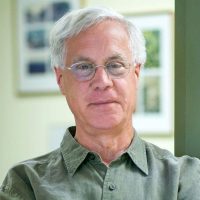
Maine Medical Center Research Institute, Maine, USA
Dr. Nadeau is internationally recognized for his work on mouse models of human disease. He has pioneered comparative genomics, genetics and systems studies of mouse models of human disease, with an emphasis on transgenerational epigenetic effects on metabolism and cancer, and most recently on phenotypic ‘noise’ in metabolic systems. His work is contributing to a revolution in the ways that we understand inheritance of phenotypic variation and disease susceptibility. He is a faculty Scientist III at Maine Health Institute for Research in Scarborough, Maine. He is the former chair and James H, Jewell Professor of Genetics at Case Western Reserve University School of Medicine. He is the founding director of the Mouse Genome Informatics Project and the Mouse Genome Database, founding director of the Ohio GI Cancer Consortium, and founding editor of two research journals, one of which (Systems Biology and Medicine) won the American Publishers Awards for Professional & Scholarly Excellence (PROSE) top award for outstanding scholarly work in all disciplines of the arts and sciences. The Smithsonian Museum deposited in their permanent collection a copy of the MGI-MGD software as an example of Innovation in Information Technology. Among his recognitions are an National Institutes of Health Pioneer Award and election as Fellow of the American Association for the Advancement of Science.
Abstract - Parsing Disease Complexity: A Phenotype-guided Perspective
What if our ideas about phenotypic variation and disease risk overlook a primary determinant? Fisher’s century-old model, phenotypic variance VP = genetics VG + environment VE + error Ve, continues to guide many areas of biomedical research. But substantial variation is not included in this model. On average, 50% of variability has neither genetic nor environmental origins. We propose that considerable non-genetic and non-environmental variation emerges during development, arising from stochastic noise that triggers probabilistic epigenetic changes, and that once established are deterministically propagated throughout life. These epigenetic changes lead to wide variation in phenotypic outcomes across many traits, in many species, and in health and disease. Clearly, managing disease, even with Precision Medicine approaches, will remain challenging if 50% of risk remains outside the scope of current research. Our ongoing work in humans and model organisms addresses many of the conceptual, study design, technical and analytical challenges. In particular, a focus on variability itself reveals common, clinically relevant cancer and metabolic subtypes that elude discovery with conventional approaches. Together these observations support a phenotype-guided virtuous cycle of human-model organism studies with discovery and experimentation in model organisms integrated with validation and refinement in humans.
Joe Nadeau1, PERMUTE Working Group, Andrew Pospisilik2
1 MaineHealth Institute for Research, Maine Medical Center, Portland, Maine
2 Center for Epigenetics, Van Andel Institute, Grand Rapids, Michigan
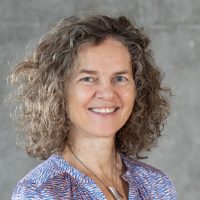
University of Copenhagen, Copenhagen, DENMARK
Mette N. Svendsen is a Professor of Medical Anthropology in the Centre for Medical Science and Technology Studies, the University of Copenhagen. She works at the forefront of the integrated study of medicine, health, and society. Since 2017, she has headed the research project MeInWe, which investigates the ethical, organizational, and legal challenges of precision medicine in contemporary healthcare (www.meinwe.ku.dk). She has an extensive publication record in leading international journals and is the author of the book Near Human: Border Zones of Life, Species, and Belonging published by Rutgers University Press.
Abstract - Empowering the Patient in the Precision Medicine Era
In this talk we explore selection practices in precision medicine. Precision medicine holds the great hope of selecting genetically fit medicine for the patient. However, in on-the-ground clinical practices, precision medicine is oriented towards selecting clinically and genetically fit patients for available therapies. Based on ethnographic research in oncology clinics and experimental labs, we show that matching patients with treatment is inseparable from dealing organizationally and morally with the large group of patients identified as unlikely to benefit from personalized cancer therapies. On one hand, precision medicine empowers patients who fit therapies or experimental trials. On the other hand, patients who have contributed their tissue and time to precision medicine, but do not match available therapies feel disempowered. They show us the huge challenges of turning the absence of personalized treatment options into care for patients.

University of Bern, Bern, SWITZERLAND
Mark A. Rubin, MD, Professor, Principal Investigator, and Director of the Department for BioMedical Research (DBMR), University of Bern, Switzerland. Prof. Mark Rubin is a recognized world-renown leader in prostate cancer genomics and pathology, and precision medicine. Dr. Rubin’s laboratory led a series of landmark studies defining distinct molecular features of prostate cancer, revealing pathways that are perturbed and drive different types of this cancer. Furthermore, Prof. Rubin has translated many of his genomic discoveries into clinical tests that are currently patented and standardly used in the diagnosis and treatment of prostate cancer. Prof. Rubin founded the Englander Institute for Precision Medicine and, more recently, the Bern Center for Precision Medicine (BCPM).
Abstract - Precision Medicine: Lessons from the Fields
Precision medicine strives to identify the right treatment at the right time for the right patient. Over the past decade, there have been several success stories in precision medicine. What is often less appreciated are the challenges faced by the broad biomedical community and healthcare systems in implementing precision medicine into our daily practice. In the lecture, I hope to provide background on the elements needed to create a learning system that will allow precision medicine to improve our care of patients. I will give specific examples of precision medicine successes and pathways for making precision medicine success a more common event.
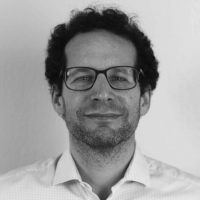
Necker Enfants Malades - Assistance Publique-Hôpitaux de Paris, Paris, FRANCE
Manuel, MD, PhD is a Professor of Paediatrics at the Reference Centre for Inborn Errors of Metabolism at Necker University Hospital and Imagine Institute, Paris. After an undergraduate degree in Biochemistry and a residency in Paediatrics, he completed a PhD in mitochondrial biology, under the supervision of Dr Pierre Rustin at the University of Paris Descartes. He then was a post-doctoral fellow at Dr Jerry Vockley’s laboratory at the University of Pittsburgh, USA. His clinical research interests include mitochondrial energy metabolism and homocysteine metabolism disorders for which he is a partner in the European collaborative network EHOD. His basic research projects include mitochondrial energy metabolism within the mitochondrial disease genetics lab directed by Agnès Rötig in the Paris Necker Imagine Institute. Manuel is a partner of the European ERA PerMed JTC2019 projects PerMiM focusing on personalized medicine in mitochondrial disease coordinated by Dr Holger Prokisch (Helmholtz Zentrum München, Germany). Gene therapies for maple syrup urine disease in mouse is the other research project for which Manuel’s research group has obtained nice preclinical results paving the way to potential future clinical trials in patients.
Manuel is coordinating the national reference centre for mitochondrial diseases (CARAMMEL) at Necker hospital and is the chair of the Society for the Study of Inborn Errors of Metabolism (SSIEM).
Abstract - Mechanism-Driven Therapies in Rare Diseases: Innovative therapies for inborn errors of metabolism: the example of MSUD
Monogenic inborn errors of metabolism (IEMs) are relevant targets for genetic therapies as they are autosomal recessive conditions with well-characterized pathophysiology and highly informative biochemical readouts; yet their therapeutic management remains complex and often cumbersome with numerous unmet therapeutic needs. Among these, maple syrup urine disease (MSUD) is a rare recessive IEM caused by the dysfunction of the branched-chain keto acid dehydrogenase (BCKD) enzyme which leads to accumulation of branched-chain amino- and keto- acids causing neonatal death if untreated. MSUD represents an unmet need as its current management is based on a life-long low-protein diet, which does not prevent the risk of acute decompensations and long-term neuropsychiatric defects. The curative effect of liver transplant in MSUD patients was an incentive for testing liver-directed innovative therapies in MSUD mice.
In the talk, we will introduce innovative therapies (mainly mRNA and gene therapies) for IEMs. Then, we will present experimental data in mice showing successful rescue of severe neonatal phenotypes in 2 mouse models of MSUD on the one hand with AAV8 gene therapy and on the other hand liver-directed mRNA therapy.
The demonstration of efficacy of these innovative therapies for MSUD demonstrate their potential for clinical translation.
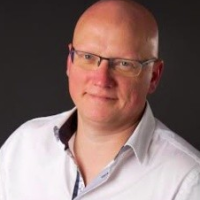
Yannick THIRIET
Thermo Fisher Scientific, FRANCE
Yannick Thiriet is a trained chemist with extensive experience in the pharmaceutical and analytical industries. After several years working in laboratories, he spent over 12 years as a National Sector Manager at Eurofins Scientific. He then joined Sciex as a Business Development Manager for automated LCM SMS equipment for clinical diagnostics. Today, he serves as the France Product Specialist for Liquid Chromatography-Mass Spectrometry solutions at Thermo Fisher Scientific.

Mälardalen University, Västerås, SWEDEN
Dr. Sarah Wamala Andersson is a distinguished thought leader in digital health and currently serves as a Professor of Health and Welfare Technology at Mälardalen University. Her research focus on the real-world implementation of AI solutions and digital health technologies within healthcare and social care systems. She evaluates policies and reimbursement models, and she generates evidence to demonstrate the value and effectiveness of digital health technologies, particularly through the lenses of equity, ethics, and sustainability.
In her academic role, she is also involved in mentoring, teaching and supervising Master’s and PhD students in areas related to digital transformation in health and social care.
Sarah holds a PhD in Medical Sciences from Karolinska Institutet and a Master’s degree in Biostatistics from Stockholm University. She has also completed postdoctoral studies at the Wellington School of Medicine in New Zealand and the Stanford Executive Program in the USA. Additionally, she has studied economics at Makerere University and epidemiology in both UK and USA.
Her career includes executive leadership roles, such as serving as the Swedish Government as Director General of the Swedish Public Health Institute and as a Professor of Health Policy at Karolinska Institutet. She also has experience in the pharmaceutical industry, having worked as a Principal Real-World Scientist at a global pharmaceutical company.
Sarah is widely published and leads several international research initiatives. She is a frequent keynote speaker at global conferences, where she shares her insights on digital health and the future of healthcare systems.
Abstract - Digital Transformation and Social Determinants of Health: Beyond Disparities
As digital technologies and artificial intelligence (AI) continue to revolutionize healthcare and public health, their capacity to address social determinants of health (SDOH) offers transformative potential for advancing health equity and sustainability. Achieving this potential requires a bold, forward-looking research agenda that promotes inclusive design, policy innovation, and systemic change.
This presentation explores how digital transformation, and AI can transcend traditional health disparity frameworks by proactively “designing for equity.” Through an evidence-based lens, it examines how technological advancements and real-time data can dismantle structural barriers to health, enhance precision health approaches, and strengthen digital health literacy among diverse populations.
Central to the discussion is the role of digital health literacy and the preparedness of healthcare professionals in narrowing the digital health equity gap. Inclusive design principles and strategies will be highlighted to ensure technological solutions effectively reach underserved and marginalized communities while addressing global health inequities, including the North-South divide.
Moving beyond the goal of merely « closing the gap, » this presentation reimagines digital transformation as a catalyst for equity-centered public health initiatives that drive sustainable, community-driven solutions. It underscores the importance of integrating AI and digital innovations

Heidelberg University Hospital, Heidelberg, GERMANY
Eva Winkler has two professional careers: in Medical Ethics and in Oncology. She is the Head of the Section for Translational Medical Ethics, University Hospital Heidelberg (UKHD), Heidelberg University. She is also a member of the Board of Directors of the National Center for Tumor Diseases, Heidelberg and works as a senior physician and specialist in hematology/oncology in the Department of Medical Oncology at UKHD.
Eva Winkler holds a doctorate in cancer research from Heidelberg University / German Cancer Research Center (DKFZ) and a PhD in medical and health ethics from the University of Basel, Switzerland (with distinction). She spent two years of her medical ethics training as part of two fellowships in the Division of Medical Ethics at Harvard Medical School and as a faculty fellow at the Center for Ethics and the Professions at Harvard University / Kennedy School of Government.
Eva Winkler’s research focuses on empirically informed applied ethics. Areas of research are:
- Research Ethics: ethical questions of precision medicine, genome sequencing and editing; overall ethical questions of translation between research and healthcare
- Clinical Ethics: especially decisions at the end of life, organizational ethics
- Public Health Ethics: resource allocation, secondary use of health data
As vice president of the Academy for Ethics in Medicine (German Society for Ethics in Medicine) and elected chairwoman of the Central Ethics Commission of the Federal Medical Association (ZEKO) Eva Winkler is committed to further advance and professionalize medical ethics and shape the discipline and its contribution to research, the healthcare system and politics.
Eva Winkler is an invited expert in important national, European and global initiatives for research-enabling infrastructures. She is the Ministry of Health appointed representative for the European Initiatives on Genomic Data Infrastructure (GDI) and 1+Million Genomes (EU) and member of the Scientific Advisory Board of the National Cohort Study (NAKO) and the Cancer Registries united at the Robert Koch Institute (RKI).
Additionally, Eva Winkler is the scientific director and spokesperson for EURAT (interdisciplinary platform for Ethical and Legal Aspects of Translational Medicine) in Heidelberg (www.eurat.info).
Abstract - The Ethical Landscape of Precision Medicine
Precision medicine promises to revolutionize healthcare by tailoring treatments to individual patients based on genetic, environmental, and lifestyle factors. However, this shift raises critical ethical questions: How can we ensure equity in access to precision treatments? What safeguards are needed to balance data-driven insights with patient autonomy and privacy? What oversight is needed for genomic data sharing, and how should we handle incidental findings or the reinterpretation of sequencing results over time? And how do we navigate the role of AI in clinical decision-making while maintaining accountability? This talk will explore the ethical principles that must guide precision medicine, addressing issues of fairness, transparency, and trust in an era of rapidly evolving medical technology.